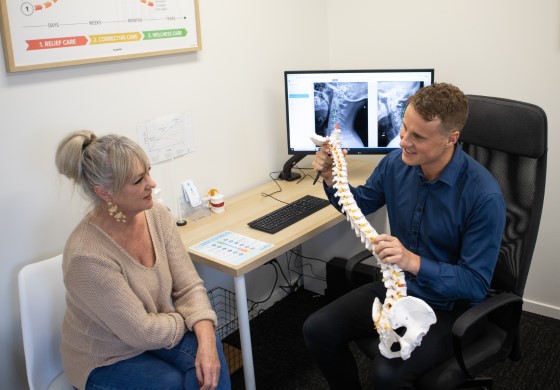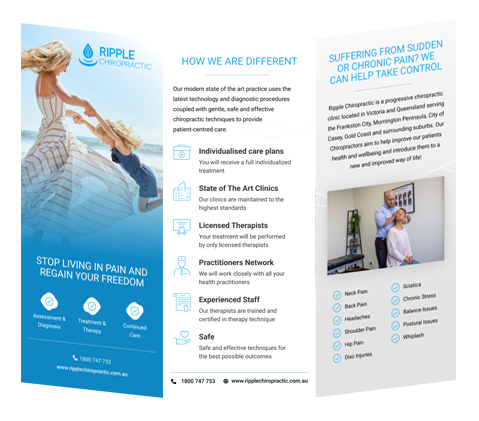Disc Conditions and Chiropractic Care
- Non-Invasive Treatment Options for Disc Conditions
- Customised Care for Herniated Discs and Spinal Stenosis
- Potential Relief for Osteoarthritis and Degenerative Disc Disease
- Holistic Approach to Improve Spinal Health and Mobility
EXCELLENTBased on 109 reviews Trustindex verifies that the original source of the review is Google.
Trustindex verifies that the original source of the review is Google. Helena Annelise2022-05-26All the chiropractors have been so helpful and their reception is friendly and personable! As someone who works 8 hours a day at a desk I am grateful to have them. Truly recommend Ripple if you are in search for a chiro to help your road to recovery. Thanks again!Trustindex verifies that the original source of the review is Google.
Helena Annelise2022-05-26All the chiropractors have been so helpful and their reception is friendly and personable! As someone who works 8 hours a day at a desk I am grateful to have them. Truly recommend Ripple if you are in search for a chiro to help your road to recovery. Thanks again!Trustindex verifies that the original source of the review is Google. Trevor Wyhoon2022-04-29Im normally not one to recommend, but this team is Fantastic!!!. They help you set goals for your care and lead you through them. Great results, cannot recommend them highly enough.Trustindex verifies that the original source of the review is Google.
Trevor Wyhoon2022-04-29Im normally not one to recommend, but this team is Fantastic!!!. They help you set goals for your care and lead you through them. Great results, cannot recommend them highly enough.Trustindex verifies that the original source of the review is Google. Laura Feddersen2022-03-25Ripple chiropractic is like no other I have experienced. The care is 10/10, the investigative work done to understand my issues was thorough. They educated me to understand how I got to this point and how we were going to correct it. I couldn't be happier at Ripple.Trustindex verifies that the original source of the review is Google.
Laura Feddersen2022-03-25Ripple chiropractic is like no other I have experienced. The care is 10/10, the investigative work done to understand my issues was thorough. They educated me to understand how I got to this point and how we were going to correct it. I couldn't be happier at Ripple.Trustindex verifies that the original source of the review is Google. Melissa Parkinson2022-02-16Highly recommend!! My family has been seeing Dr Aleks and the team at Ripple Chiropractic for many months now and we cannot be happier with the level of care and treatment we have received. We have all had amazing results and cannot thank Dr Aleks enough.
Melissa Parkinson2022-02-16Highly recommend!! My family has been seeing Dr Aleks and the team at Ripple Chiropractic for many months now and we cannot be happier with the level of care and treatment we have received. We have all had amazing results and cannot thank Dr Aleks enough.
Living with disc conditions such as osteoarthritis, herniated discs, and spinal stenosis can significantly impact your daily life, causing persistent pain and discomfort. Appropriate treatment can be important for managing these conditions and improving your overall quality of life.
Chiropractic care offers a non-invasive, holistic approach that may help manage disc conditions, potentially providing relief and promoting long-term health.
At Ripple Chiropractic, we can aid in various disc-related issues, offering personalised care to help you achieve optimal health and well-being.
What Are the Different Types of Disc Conditions a Chiropractor Could Help With?
Disc conditions refer to a variety of issues that affect the intervertebral discs within the spinal column. These discs act as cushions between the vertebrae, providing flexibility and absorbing shock.
Chiropractors can help manage several types of disc conditions, including herniated discs, osteoarthritis, disc degeneration, and spinal stenosis.
Herniated Discs
A herniated disc occurs when the soft inner material of a disc pushes through a tear in the tougher outer layer. This can put pressure on nearby nerves, including the spinal nerves and nerve roots, causing pain, numbness, or weakness in the affected area.
Osteoarthritis
Osteoarthritis is a degenerative joint disease that can affect the spine. It occurs when the protective cartilage that cushions the ends of bones wears down over time, leading to pain, stiffness, and swelling. In the lumbar spine, osteoarthritis can cause the formation of bone spurs and degeneration of the discs, leading to further discomfort.
Disc Degeneration
Disc degeneration, also known as degenerative disc disease, involves the gradual deterioration of the intervertebral discs due to ageing or wear and tear. This condition can lead to chronic back pain, decreased mobility, and increased risk of herniation.
Disc degeneration can affect the lumbar spine and the nerve roots, leading to symptoms that can significantly impact daily life.
Spinal Stenosis
Spinal stenosis is a condition where the spinal canal narrows, putting pressure on the spinal cord and spinal nerves. This can cause pain, numbness, and weakness in the arms or legs. Symptoms often worsen with activities such as walking or standing for long periods.

Disc conditions can be diagnosed through a medical history review, physical exam, neurological tests and imaging studies.
What are the Common Symptoms for These Disc Conditions?
Disc conditions can present a range of symptoms that vary in severity, including:
- Persistent back pain, which can be localised or radiate to other areas
- Sciatica or leg pain, often caused by nerve compression
- Neck pain, which can be accompanied by headaches
- Tingling or numbness in the extremities, particularly the arms and legs
- Muscle weakness, which may affect your ability to perform daily tasks
- Difficulty standing or walking for extended periods
- Muscle spasms, causing sudden and involuntary contractions
- Pain, which can range from a dull ache to sharp, debilitating discomfort
What Causes Disc Conditions?
The primary causes of disc conditions include:
- Age-Related Wear and Tear (Degenerative Discs): As we age, the discs between our vertebrae can lose moisture and flexibility, leading to degeneration. This process can also contribute to the development of bone spurs, which can exacerbate disc conditions.
- Poor Posture and Body Mechanics: Incorrect posture and improper lifting techniques can put excessive strain on the spine, potentially leading to disc conditions.
- Traumatic Injury: Accidents or injuries can cause immediate damage to the discs, sometimes resulting in the formation of bone spurs as a response to the injury.
- Genetic Predisposition: Family history can play a role in the development of disc conditions, including the tendency to develop bone spurs.
- Repetitive Strain or Heavy Lifting: Frequent heavy lifting or repetitive motions can contribute to disc wear and tear, increasing the risk of bone spurs.
- Obesity: Excess weight can increase pressure on the spine, leading to disc issues and the potential development of bone spurs.
How Is It Diagnosed?
Diagnosing disc conditions involves a comprehensive approach, including:
- Medical History Review: Understanding your medical background and any previous medical problems, back or neck issues.
- Physical Exam: Assessing your posture, range of motion, and physical symptoms.
- Neurological Tests: Evaluating reflexes, muscle strength, and nerve function.
- Imaging Studies: Using X-rays, magnetic resonance imaging (MRI), or CT scans to get a detailed view of the spine which can help confirm diagnosis and identify any abnormalities.
Stop Living in Pain and Regain Your Freedom
Am I a Suitable Candidate for Chiropractic Care?
You may be a suitable candidate for chiropractic treatment if you:
- Experience Chronic Back or Neck Pain: Persistent pain that does not improve with conventional treatments such as physical therapy or medications. Chiropractic care may help relieve pain and improve movement.
- Have Been Diagnosed with a Disc Condition: Conditions such as osteoarthritis, spinal stenosis or herniated disc may benefit from chiropractic care, which aims to ease pain and reduce joint damage without the need for invasive procedures.
- Prefer Non-Invasive Treatment Options: Seeking alternatives to surgery, such as joint replacement surgery or spine surgery, chiropractic care offers a non-invasive approach to managing disc conditions.
- Are Seeking Additional Treatment Options: If other treatments have not provided sufficient relief, chiropractic care may offer new approaches for pain relief and mobility improvement.
How Can Chiropractic Care Help Disc Conditions?
Chiropractic care offers several potential treatment options for disc conditions:
- Herniated Disc Chiropractic Treatment Techniques: Chiropractors use specific adjustments and techniques that may help relieve pressure on the affected disc and surrounding nerves, potentially promoting healing and reducing pain.
- Bulged Disc Treatment: Chiropractic care aims to realign the spine and relieve pressure on the bulged disc, helping to alleviate pain and improve function.
- Spinal Stenosis Chiropractic Treatment: Focused on aiming to improve spinal alignment and increase the space within the spinal canal, which may help reduce nerve compression and associated symptoms.
- Osteoarthritis Pain Relief: Targeted chiropractic adjustments and therapies that may help alleviate joint pain, reduce inflammation, and improve mobility.
- Spondylolisthesis Chiropractic Treatment: Customised care plans to stabilise the spine, reduce pain, and prevent further slippage of the vertebrae.
- Degenerative Discs Treatment: Techniques aimed at reducing pain, improving disc health, and enhancing overall spinal function.
Why Choose Us for Your Disc Condition Treatment?
Ripple Chiropractic is committed to providing exceptional care for patients suffering from a disc condition. Here’s why you should choose us:
Individualised care plans
You will receive a full individualised treatment
State of The Art Clinics
Our clinics are maintained to the highest standards.
Licensed Therapists
Your treatment will be performed by only licensed therapists
Practitioners Network
We will work closely with all your health practitioners
Experienced Staff
Our therapists are trained and certified in therapy technique
Safe
Safe and effective techniques for the best possible outcomes.
How to Schedule an Appointment for Disc Condition Treatment
If you’d like to book an initial consultation, call us on 1800 747 753 or fill out our online booking form.
FAQs
If you have any more questions about chiropractic care for disc conditions, please don’t hesitate to contact us today. In the meantime, check out our most frequently asked questions below which may provide additional information you’re looking for.
What is the success rate of chiropractic treatment for disc conditions?
Chiropractic treatment has shown positive results for many patients suffering from disc conditions. It may significantly reduce pain, improve mobility, and enhance overall quality of life for some patients. Success depends on the severity of the condition, the patient’s adherence to the treatment plan, and the chiropractor’s expertise. Regular follow-ups and a comprehensive care plan can lead to long-term relief and improved spinal health.
How many sessions will I need for herniated disc treatment?
The number of sessions required for herniated disc treatment varies depending on the severity of the condition and individual response to treatment. On average, patients may need multiple sessions over several weeks to achieve significant improvement. Your chiropractor will develop a personalised treatment plan that includes the recommended number of sessions and any additional therapies that may be beneficial. Regular assessments will track your progress and adjust the treatment plan as needed.
Can chiropractic care help with slipped disc relief?
Yes, chiropractic care may be highly effective in providing relief for slipped discs. Through specific adjustments and spinal manipulations, chiropractors can reduce pressure on the affected disc and surrounding nerves. This not only alleviates pain but also promotes healing and prevents further complications. Chiropractors may also recommend exercises and lifestyle modifications to support recovery and prevent recurrence.
Are there any risks associated with chiropractic treatment for spinal stenosis?
Chiropractic care is generally considered safe, especially when performed by a licensed and experienced chiropractor. However, as with any treatment, there are some risks. It is important to discuss your medical history and any concerns with your chiropractor to ensure that chiropractic care is appropriate for your condition. Your chiropractor will use gentle and controlled techniques to minimise any potential risks and ensure a safe and effective treatment experience.
What can I expect during my first chiropractic visit for disc conditions?
During your first chiropractic visit for disc conditions, you can expect a thorough evaluation to determine the best treatment plan for your needs. The chiropractor will begin with a comprehensive medical history review, asking about your symptoms, any previous treatments, and your overall health.
A physical examination will follow, focusing on your posture, range of motion, and specific areas of pain or discomfort. The chiropractor may also perform neurological tests to assess nerve function and strength. If necessary, imaging studies such as X-rays or MRI scans may be recommended to get a detailed view of your spine and diagnose the exact issue. Based on these findings, the chiropractor will discuss your diagnosis and propose a personalised treatment plan, explaining the techniques and expected outcomes. This visit is also an opportunity for you to ask any questions and understand the process of your chiropractic care.
General Information Disclaimer: The content provided here is for informational purposes only and is not intended as medical advice, diagnosis, or treatment. Always seek the advice of your health professional with any questions you may have regarding a medical condition. The information on this site is general in nature and may not reflect current medical developments or research. Your reliance on any information provided by this site is solely at your own risk.
Grab Our New Patient Offer Today
Consultation + 1st Treatment

We are offering a special price for your consultation + 1st treatment which will include all of the following:
- Comprehensive history including chief complaint, trauma and medical history.
- Health goal setting
- Orthopedic exam
- Neurological Exam
- Biostructural Exam
- 3D posture analysis
- Range of motion exam
- Referral for diagnostic imaging if clinically appropriate
- First follow up treatment


